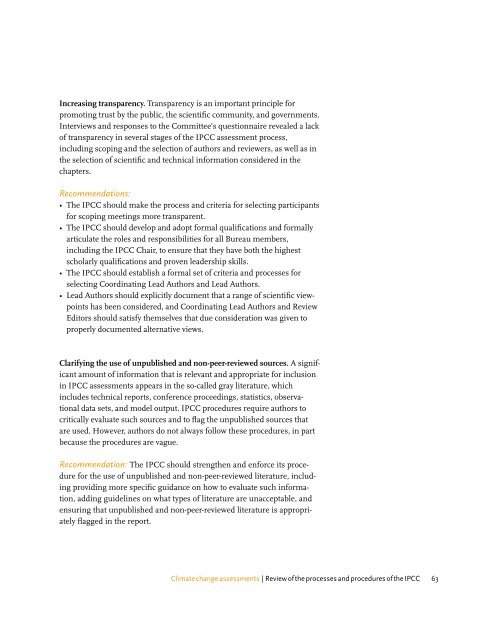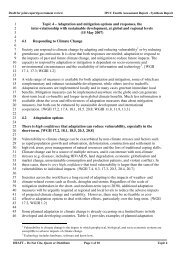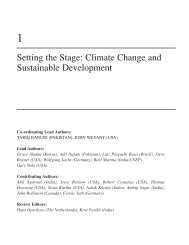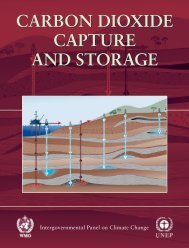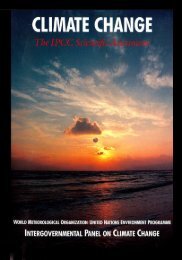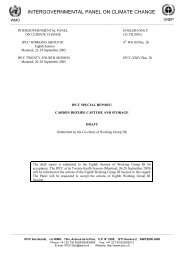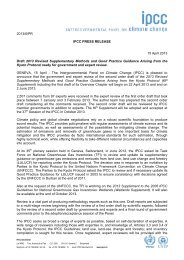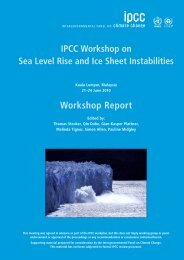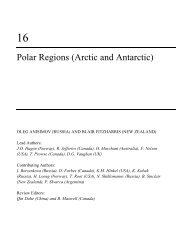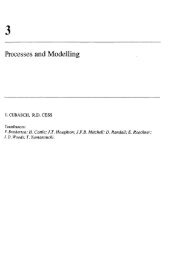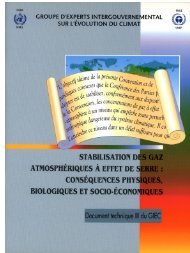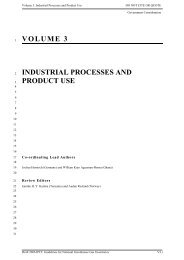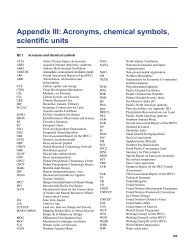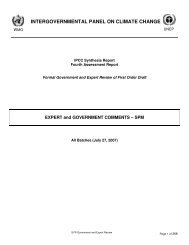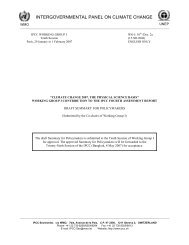Climate change assessments Review of the processes and ...
Climate change assessments Review of the processes and ...
Climate change assessments Review of the processes and ...
You also want an ePaper? Increase the reach of your titles
YUMPU automatically turns print PDFs into web optimized ePapers that Google loves.
Increasing transparency. Transparency is an important principle for<br />
promoting trust by <strong>the</strong> public, <strong>the</strong> scientific community, <strong>and</strong> governments.<br />
Interviews <strong>and</strong> responses to <strong>the</strong> Committee’s questionnaire revealed a lack<br />
<strong>of</strong> transparency in several stages <strong>of</strong> <strong>the</strong> IPCC assessment process,<br />
including scoping <strong>and</strong> <strong>the</strong> selection <strong>of</strong> authors <strong>and</strong> reviewers, as well as in<br />
<strong>the</strong> selection <strong>of</strong> scientific <strong>and</strong> technical information considered in <strong>the</strong><br />
chapters.<br />
Recommendations:<br />
• The IPCC should make <strong>the</strong> process <strong>and</strong> criteria for selecting participants<br />
for scoping meetings more transparent.<br />
• The IPCC should develop <strong>and</strong> adopt formal qualifications <strong>and</strong> formally<br />
articulate <strong>the</strong> roles <strong>and</strong> responsibilities for all Bureau members,<br />
including <strong>the</strong> IPCC Chair, to ensure that <strong>the</strong>y have both <strong>the</strong> highest<br />
scholarly qualifications <strong>and</strong> proven leadership skills.<br />
• The IPCC should establish a formal set <strong>of</strong> criteria <strong>and</strong> <strong>processes</strong> for<br />
selecting Coordinating Lead Authors <strong>and</strong> Lead Authors.<br />
• Lead Authors should explicitly document that a range <strong>of</strong> scientific viewpoints<br />
has been considered, <strong>and</strong> Coordinating Lead Authors <strong>and</strong> <strong>Review</strong><br />
Editors should satisfy <strong>the</strong>mselves that due consideration was given to<br />
properly documented alternative views.<br />
Clarifying <strong>the</strong> use <strong>of</strong> unpublished <strong>and</strong> non-peer-reviewed sources. A significant<br />
amount <strong>of</strong> information that is relevant <strong>and</strong> appropriate for inclusion<br />
in IPCC <strong>assessments</strong> appears in <strong>the</strong> so-called gray literature, which<br />
includes technical reports, conference proceedings, statistics, observational<br />
data sets, <strong>and</strong> model output. IPCC procedures require authors to<br />
critically evaluate such sources <strong>and</strong> to flag <strong>the</strong> unpublished sources that<br />
are used. However, authors do not always follow <strong>the</strong>se procedures, in part<br />
because <strong>the</strong> procedures are vague.<br />
Recommendation: The IPCC should streng<strong>the</strong>n <strong>and</strong> enforce its procedure<br />
for <strong>the</strong> use <strong>of</strong> unpublished <strong>and</strong> non-peer-reviewed literature, including<br />
providing more specific guidance on how to evaluate such information,<br />
adding guidelines on what types <strong>of</strong> literature are unacceptable, <strong>and</strong><br />
ensuring that unpublished <strong>and</strong> non-peer-reviewed literature is appropriately<br />
flagged in <strong>the</strong> report.<br />
<strong>Climate</strong> <strong>change</strong> <strong>assessments</strong> | <strong>Review</strong> <strong>of</strong> <strong>the</strong> <strong>processes</strong> <strong>and</strong> procedures <strong>of</strong> <strong>the</strong> IPCC 63


